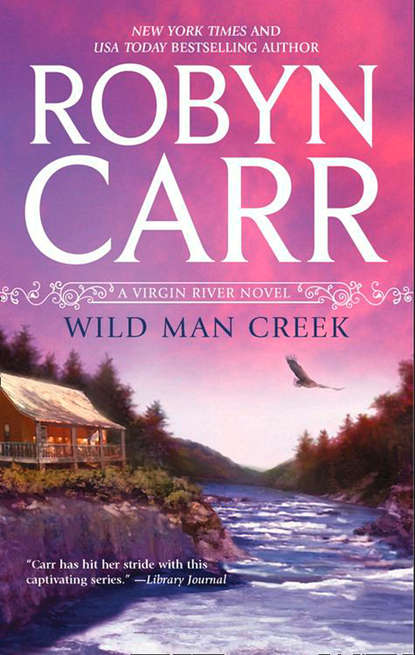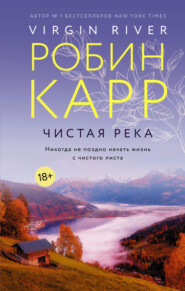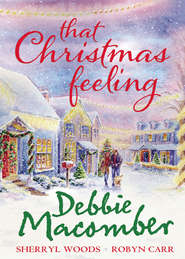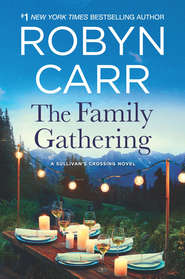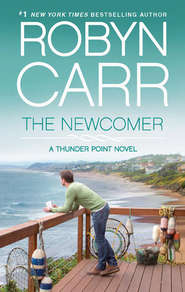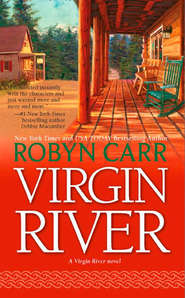По всем вопросам обращайтесь на: info@litportal.ru
(©) 2003-2024.
✖
Wild Man Creek
Настройки чтения
Размер шрифта
Высота строк
Поля
And there was something else she was having real trouble dealing with—she wasn’t sure if she mourned more for the lost relationship or the lost job.
Ironically, it was that weird old house and the memories it invoked that had originally made her think of Virgin River as her escape. Yet it took her three days of fishing, walking, reading and just thinking before she recalled how it made her feel. She wanted to go back to see that house.
And, oh! The house had changed in the six months since she’d seen it last! It was now simply beautiful! So different from when she had last seen it. It was painted white with tan and brown trim; the shutters were dark, the trim lighter. The gables were decorated and the turrets at the front end of the structure stood as proud as those at any castle. The porch had been reinforced and painted tan and white; new doors and windows had been installed. It was a stunning, refurbished house that might be a hundred years old but that looked as fresh and new as the day it had been built.
And if the house wasn’t amazing in itself, the grounds were as fabulous as she remembered—manicured shrubs, flowers just coming up and lining the base of the house and walk, trees sprouting buds. She identified hydrangea and rhododendron along with some other bushes that would burst into flower in another month. She walked slowly around the house and lawn, taking it in, sighing and oohing and aahing. She went up onto the porch and peeked into the window, seeing that, as she suspected, the place was empty. No one lived here.
This was not really like the house she and Kelly had grown up in—her nana’s house was so much smaller, a little three-bedroom with the downstairs bedroom off the kitchen no bigger than a large closet. But it, too, had been an old Victorian clapboard with gables and a big yard, and front and back porches.
Jillian and Kelly had been on their own for several years now. When they were only five and six years old there had been a car accident; their father was killed and their mother was left an invalid. Their already-elderly great-grandmother took them on, along with their mother, who needed daily care. The girls grew up in that little house in an older neighborhood in Modesto, California. Because their mother was in a wheelchair and had very limited mobility even in that, she slept downstairs in an old-fashioned hospital bed while the girls shared one upstairs bedroom and Nana had the other one. Their mother was the first to go when the girls were in high school; their great-grandmother passed when they were in their twenties. She’d been in her early nineties.
Walking around the back porch, Jill realized that the last time she’d been here she’d sat in a rusty porch chair that the old woman who’d lived here had died in. Now she sat on the porch steps, leaned against the post and looked out at the huge yard—big as a football field up to the tree line. Most of the property was taken up by an enormous garden that needed weeding for spring planting.
It was so quiet here Jill could hear herself think. And what she thought was, How could he touch me the way he did when he knew he was going to steal my job, destroy my reputation and break my heart? How does one human being do that to another? And she began to cry again, something she only allowed herself to do when she was completely alone. How could he say the things he said? she wondered. Jillian, marry me. Jillian, you’re the best thing that ever happened to me. Jillian, I can’t live without you, and I mean that. You’re so much more important to me than any job.
It was the deliberateness of the premeditated lies that was incomprehensible to her. Oh, Jill knew how to tell small lies, how to tell a fat girl in a bright red dress that the color was good on her, that she was late because of traffic, that she’d only just gotten the message, that sort of thing. But how do you hold a naked person, whisper those loving things when all along your plan is to throw them under the bus? This was something she could never do to another human being.
Tears ran down her cheeks as she walked around the backyard, eventually gravitating to a large aluminum storage shed. Still sniffing, she pulled open the unlocked double doors and found a riding lawnmower along with all of the old woman’s gardening tools. She didn’t want to disturb things, but thought it was harmless enough to pull out a spade. She went to work on the huge backyard garden, turning soil in the muddy patch. The woman who had lived here was eighty-six when she died, Jill had been told. Yet she had gardened a small farm. That was just like her nana.
When they were little girls, Nana had Jill and Kelly working in the garden, the kitchen, and though Nana had never had much formal education, she taught them to read so they could take turns reading to their handicapped mother. They had garden, kitchen and house chores until they officially moved away. They worked hard through childhood, but it was good work. It probably set them up to never fear hard work. Nana used to say, “God blesses me with work.” And oh, was Nana blessed! She took in laundry, ironing, sold her canned vegetables, chutneys, sauces and relishes and helped her neighbors. There was some Social Security for herself and the girls who had lost their father. They worked to the bone and barely got by.
It was the absence of work and love that hurt Jill’s heart. She dug at the garden and cried, ignoring her tears and getting herself all muddy. When the spade didn’t pull out a weed, she was on her knees giving it a tug.
There were seeds and bulbs in the shed and judging by the new green growth all around, it was planting time. About three hours after she had arrived she had a large portion of the huge garden tilled, weeded, turned and had even pushed some old, stored bulbs of unknown type that she’d found in the shed into the ground. Instinctively she knelt and scooped up some soil, giving it a sniff—her nose was a little stuffy and rusty, but she couldn’t detect any chemicals. She hadn’t seen any pesticides in the shed; she suspected the old woman had been an organic gardener. She kept digging and weeding. And all the while she cried soft, silent, painful, cleansing tears.
“Um, excuse me,” a man said.
She was on her knees, mud up to her elbows. She gasped, sat back on her heels and wiped impatiently at the tears on her cheeks. She looked up at a very tall man; he looked somewhat familiar, but she couldn’t place him.
“Everything all right?” he asked her.
“Um, sure. I was just, um, remembering my great-grandmother’s garden and I—well I guess I got a little carried away here.” She stood up and brushed at her knees, but it did no good.
He smiled down at her. “Must have been quite the garden. Hope gardened like a wild woman every summer. She gave away almost all of her produce and complained about the wildlife giving her hell. But she must’a loved it, the way she went after it.” He tilted his head. “You miss your grandma or something?”
“Huh?”
“Well, if you’ll pardon me, seems like maybe you’re crying. Or something.”
“Oh!” she said, wiping at her eyes again. “Yes, I was missing her!”
“That isn’t going to help much, with your hands all dirty,” he said. He pulled a handkerchief out of his pocket. “Here. Come on out of the mud. Wipe off your face before you get that dirt in your eyes.”
She sniffed and took the clean, white handkerchief. “This your house now?” she asked, wiping off her face, amazed by the amount of dirt that came off on the cloth.
He laughed. “Nah. I worked on it, that’s all.” He stuck out his hand, then lifted his eyebrows—her hand was caked in mud. He reconsidered and withdrew his hand. “Paul Haggerty. General Contractor. I build and rebuild and restore around here.”
“Jillian Matlock,” she said, looking down at what had happened to her perfectly manicured, executive businesswoman’s hands. Destroyed. She pulled her hand back and wiped it on her jeans. “Whose house is it then?” she asked.
“The town’s. Hope left the house, land and her trust to the town.”
“Ah, that’s right! I was here last fall. I came to the estate sale and someone told me about that. So what’s going to happen to it?”
He stuck his hands in his pockets, rolled back on his heels and looked skyward. “Been a lot of talk about that. They could make it a museum, an inn, a town hall. Or just sit on it awhile. Or sell it—but with the economy down, it probably won’t pull a good sale price just now.”
“So no one really owns it?” Jillian asked.
“The town does. The guy in charge is Jack Sheridan. He has a bar in town.”
“No new owner?” she asked.
“Nope.”
“Gee, I’d love to see what you did inside.”
He grinned. “And gee, I’d love for you to, but you’re a mess!”
She looked down at herself. “Yeah. I lost my head. Got a little caught up in clearing her garden and getting it ready. For what, God knows.”
“It’s not locked,” Paul said. “But I’d consider it a personal favor if you’d wipe your feet before going in.”
She was shocked; her eyes were round and amazed. “Not locked?”
“Nope,” he said with a shrug.
“So … no Realtor has the listing yet?” Jill asked.
“Not as far as I know, but then I barely finished with the redo. Jack would be the one to talk to.”
“Tell you what, this will make you happy. I’m going to go home …. Um, I’m staying in a cabin out by the river ….”
“Riordans’,” he said with a smile.
Boy, this was a tight group, she thought. “Right. If it’s all right with you, I’ll come back out here tomorrow morning and give myself a little tour. I’ll be all clean and won’t track dirt in your house.”
His grin was huge. “And I thank you from the bottom of my heart. I painted and waxed those floors.” Then he blushed a little. “Well, I got it done.”
She smiled right back at him. “I know what a general contractor does. So, what does a place like this usually go for?”
“Who knows?” he said. “Put it in Fortuna, maybe seven hundred and fifty thousand. Restored, maybe a million. Lot of rooms in that house but only a couple of baths—I added one small one with a shower to make it three. Put it in a place like Menlo Park or San Jose—three million. Problem with real estate right now—it’s worth whatever you can get.”
“I hear that,” she said. “Listen, I’m going to take off.” She looked at the handkerchief. “I’ll, um, launder this for you.”
“Not to worry. I have a few.”
“I’m going to clean up and come back tomorrow, look through the house, if you’re sure it’s okay.”
“It’s okay. Half the town’s been through the house. They’re real nice about not leaving marks or tracks and that’s appreciated.”





